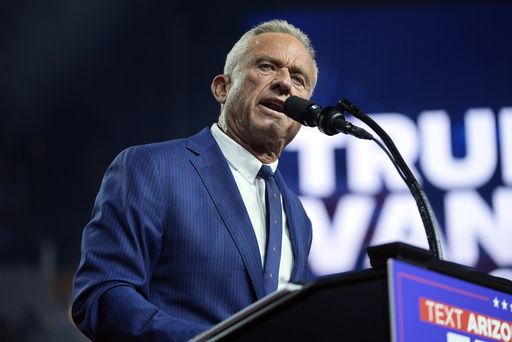Robert F. Kennedy Jr. has taken legal action in Wisconsin to have his name removed from the state’s presidential ballot. Even though he suspended his campaign in August and backed Republican candidate Donald Trump, the state elections commission voted to keep Kennedy on the ballot. Kennedy had announced his intention to try to remove his name from battleground states’ ballots, while permitting his supporters to continue endorsing him in states where their votes are less likely to impact the outcome.
Kennedy has also filed a similar lawsuit in Michigan, where a judge ruled against his removal from the ballot. Another lawsuit in North Carolina seeking his elimination from the ballot is currently pending. In the Wisconsin lawsuit filed in Dane County Circuit Court, Kennedy argued that third-party candidates face discrimination under state law compared to Republican and Democratic presidential candidates.
The lawsuit points out that Republicans and Democrats have until 5 p.m. on the first Tuesday in September before an election to certify their presidential nominee, whereas independent candidates like Kennedy can only withdraw before the August 6 deadline for submitting nomination papers. The law in Wisconsin does not offer a process for independent presidential candidates to withdraw from the ballot post-nomination unless they pass away, and Kennedy had submitted his papers before the August 6 deadline.
The Wisconsin Elections Commission approved Kennedy’s name for the ballot with a 5-1 vote last week, after a move by Republican commissioners to remove him failed. This decision allowed county election clerks to start printing ballots to meet upcoming state deadlines for mailing absentee ballots. Kennedy is now seeking a court order to prevent the elections commission from placing his name on the ballot and to delay the commission’s vote on the matter.
There has been no response from the Wisconsin Elections Commission to inquiries regarding the lawsuit. Kennedy is one of eight presidential candidates listed on the ballot in Wisconsin. The presence of independent and third-party candidates could play a significant role in the state’s electoral outcome, as Wisconsin has seen tight margins in recent presidential elections. For instance, in 2016, Green Party candidate Jill Stein received over 31,000 votes in Wisconsin — surpassing Trump’s winning margin of approximately 23,000 votes. Some Democrats have criticized Stein for potentially aiding Trump in securing victory in Wisconsin and the presidency.
